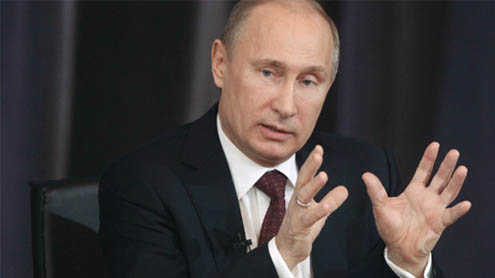
Vladimir Putin, the Russian president, has moved to inject some moral fibre into the country’s top-level bureaucrats and state employees by giving them a three-month deadline to close their foreign bank accounts and divest themselves of offshore assets — or face the sack.
According to a new presidential decree, signed on Tuesday, thousands of Russian civil servants have until July 1 to file declarations of income and assets, which will be subject to stringent checks. No one would be above the law, said Sergei Ivanov, Mr Putin’s chief of staff, and anyone caught still in possession of the prohibited assets would be instantly dismissed.The decree is the president’s latest move to “de-offshore” Russia’s economy, a mission he outlined last December in a major policy address. According to a number of policy makers, the aim is not just to tackle corruption among the political elite — famed for its ability to extract and squirrel away vast sums — but also to make its members less vulnerable to foreign influence.
“This is [the] nationalisation of the elite,” said Konstantin Kostin, the former Kremlin deputy head of domestic policy who now heads the Foundation for the Development of Civil Society, a Moscow think-tank.”For a long time, many in the elite saw Russia as a hunting ground — they would keep their money and live somewhere else,” he added. “That problem cannot be addressed by one law, of course, but only by political willpower and the consolidation of society around the idea.”Mr Putin put the initiative at the heart of his annual state of the nation address in December. “The responsibility for the country is formed not out of slogans and speeches, but when people see that the government is transparent,” he said then.
At the time, the speech received so much applause from the sycophantic audience of top officials and lawmakers that he had to tell them to be quiet, adding that they might not like to hear everything he had to tell them.But actual implementation has been problematic. “The bureaucracy has ways of defending its interests,” said Kirill Kabanov, head of the National Anti-Corruption Committee, a privately funded organisation.Two pieces of legislation based on Mr Putin’s speech have become stuck in the Duma, or lower house of parliament. In December, deputies submitted a law based on the president’s recommendations but it made no progress until Mr Putin himself submitted a revised version in February. That law passed the first of three readings on February 22, but since then no date for a second or third reading has been set, which can mean that a piece of legislation has in effect been buried.
Mr Putin’s decree is apparently intended to stiffen political spines and spur the passage of a law rather than do away with the need for one, with conventional legislation seen as giving the anti-corruption drive a greater mandate.”The [foreign assets] law will go through, but not in the expected timeframe,” said Mr Kabanov. “[The elite] needed a decree to demonstrate to them the president’s resolve, and to introduce the new reporting requirements in time for this year.”The decree, he said, was also intended to impose the same restrictions on top-level employees of state corporations — a stipulation that was not present in the Putin version of the law.
Ksenia Sorokina, editor of Moscow-based Snob magazine, said: “There is a sort of algorithm [in Russia] for civil servants. You stash a lot of money abroad, send your family to live there, and then when you retire, you join them. This new legislation will put a question mark next to the career plan of a generation of top-level people.”However, the decree appeared to contain loopholes. For example, Yevgeny Shkolov, a senior official in the president’s administration, told the news agency Interfax that revenues of companies registered to family members of civil servants need not be declared.● President Vladimir Putin signed a law on Tuesday letting him pick candidates to lead Russia’s regions if local lawmakers scrap popular polls, in what critics called a setback for democracy, Reuters reports from Moscow.
The law allows each of the country’s 83 regions to repeal direct elections of governors, introduced just last year in a concession during a wave of protests. Mr Putin has said the law is needed to protect the rights of minorities in ethnically mixed regions such as the North Caucasus. But critics say the law is a setback for democracy in that it favours the ruling United Russia party, which is far less popular than the president himself and had its parliamentary majority sharply reduced in a December 2011 election. – CNN












